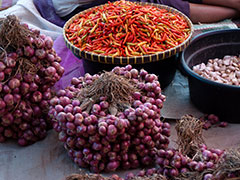Promoting Competitiveness and Inclusiveness
Motivation
Rapid economic growth in Indonesia has led to a rising demand for food quality and food safety, as well as the growth of supermarkets. Will smallholders benefit from supplying these growing markets, or will they be marginalized by their inability to meet the quality and quantity requirements of large-scale retailers? Funded by the Australian Centre for International Agricultural Research (ACIAR) between 2008-2013, IFPRI partnered with the University of Adelaide and other advanced and developing-country research institutions to study the transformation of markets for high-value agricultural commodities in Indonesia, including chilies, shallots, mangoes, mangosteens, and shrimp. The project’s goal was to better understand the changes to the markets for these products, how these trends affect different participants, particularly the poor, and how to identify the policy measures that could reduce the negative impact on small farmers and traders.
Outcomes
Researchers are using farmer surveys to examine production methods, constraints to meeting higher standards, and perceived changes in the sector. Surveys and interviews with traders focus on knowledge, attitude, and practices regarding quality and food safety. A survey of urban consumers attempts to understand the rate of change in consumer demand by examining what determines demand for different types of food quality and safety. The project, to be completed in December 2013, is already yielding outcomes.
- Two Indonesian research institutes received training from IFPRI in how to use the latest survey analysis software and now use that software to process questionnaires.
- Six Indonesian PhD students at the University of Adelaide are using datasets from IFPRI’s project in their research.



